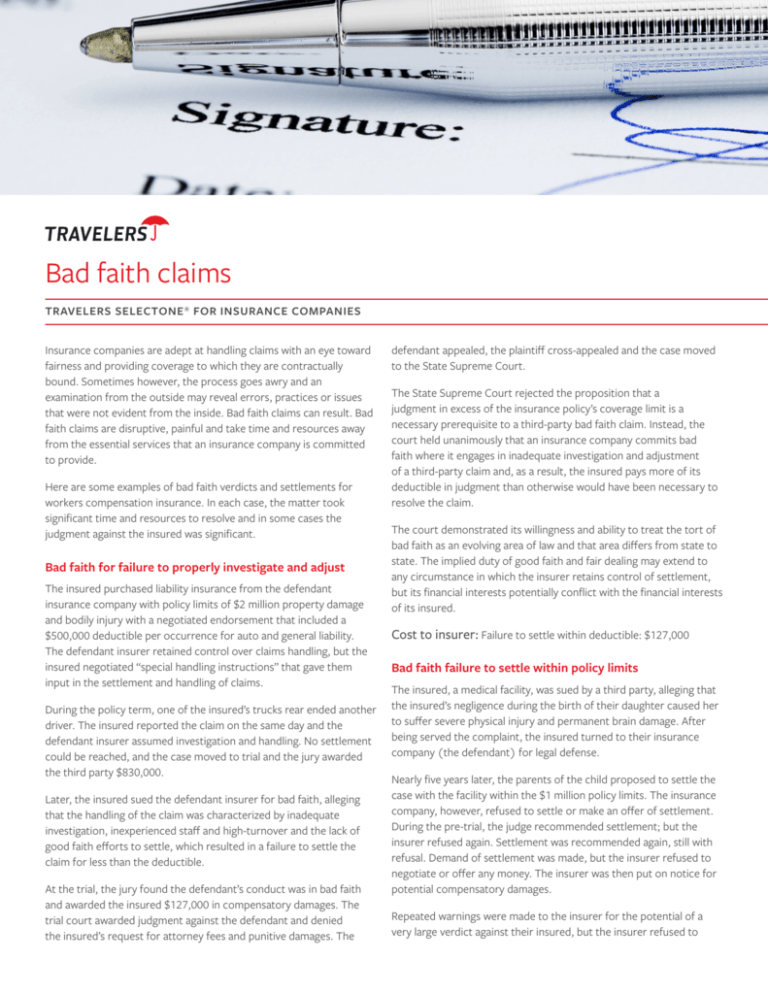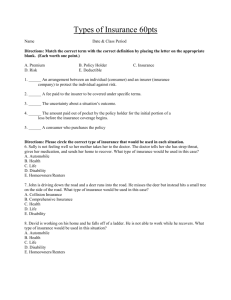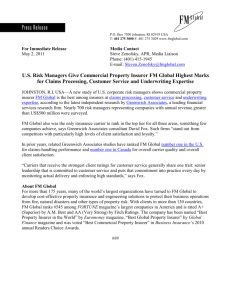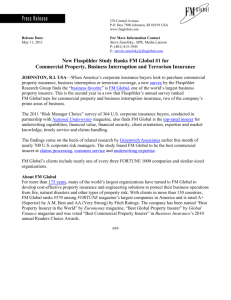
Bad faith claims
TRAVELERS SELECTONE ® FOR INSURANCE COMPANIES
Insurance companies are adept at handling claims with an eye toward
fairness and providing coverage to which they are contractually
bound. Sometimes however, the process goes awry and an
examination from the outside may reveal errors, practices or issues
that were not evident from the inside. Bad faith claims can result. Bad
faith claims are disruptive, painful and take time and resources away
from the essential services that an insurance company is committed
to provide.
Here are some examples of bad faith verdicts and settlements for
workers compensation insurance. In each case, the matter took
significant time and resources to resolve and in some cases the
judgment against the insured was significant.
Bad faith for failure to properly investigate and adjust
The insured purchased liability insurance from the defendant
insurance company with policy limits of $2 million property damage
and bodily injury with a negotiated endorsement that included a
$500,000 deductible per occurrence for auto and general liability.
The defendant insurer retained control over claims handling, but the
insured negotiated “special handling instructions” that gave them
input in the settlement and handling of claims.
During the policy term, one of the insured’s trucks rear ended another
driver. The insured reported the claim on the same day and the
defendant insurer assumed investigation and handling. No settlement
could be reached, and the case moved to trial and the jury awarded
the third party $830,000.
Later, the insured sued the defendant insurer for bad faith, alleging
that the handling of the claim was characterized by inadequate
investigation, inexperienced staff and high-turnover and the lack of
good faith efforts to settle, which resulted in a failure to settle the
claim for less than the deductible.
At the trial, the jury found the defendant’s conduct was in bad faith
and awarded the insured $127,000 in compensatory damages. The
trial court awarded judgment against the defendant and denied
the insured’s request for attorney fees and punitive damages. The
defendant appealed, the plaintiff cross-appealed and the case moved
to the State Supreme Court.
The State Supreme Court rejected the proposition that a
judgment in excess of the insurance policy’s coverage limit is a
necessary prerequisite to a third-party bad faith claim. Instead, the
court held unanimously that an insurance company commits bad
faith where it engages in inadequate investigation and adjustment
of a third-party claim and, as a result, the insured pays more of its
deductible in judgment than otherwise would have been necessary to
resolve the claim.
The court demonstrated its willingness and ability to treat the tort of
bad faith as an evolving area of law and that area differs from state to
state. The implied duty of good faith and fair dealing may extend to
any circumstance in which the insurer retains control of settlement,
but its financial interests potentially conflict with the financial interests
of its insured.
Cost to insurer: Failure to settle within deductible: $127,000
Bad faith failure to settle within policy limits
The insured, a medical facility, was sued by a third party, alleging that
the insured’s negligence during the birth of their daughter caused her
to suffer severe physical injury and permanent brain damage. After
being served the complaint, the insured turned to their insurance
company (the defendant) for legal defense.
Nearly five years later, the parents of the child proposed to settle the
case with the facility within the $1 million policy limits. The insurance
company, however, refused to settle or make an offer of settlement.
During the pre-trial, the judge recommended settlement; but the
insurer refused again. Settlement was recommended again, still with
refusal. Demand of settlement was made, but the insurer refused to
negotiate or offer any money. The insurer was then put on notice for
potential compensatory damages.
Repeated warnings were made to the insurer for the potential of a
very large verdict against their insured, but the insurer refused to
tender policy limits. The parents made a high/low offer of settlement,
which was still marked by refusal. A final pre-trial conference
occurred. During trial but prior to the case going to the jury, the
insurer continued to refuse to offer any money to settle the case. The
judge stated that the insurer’s actions were in bad faith and that it was
putting its interests ahead of those of its insured.
The jury awarded verdict of $4.5 million against the insured medical
facility; but with delay damages and interest, the judgment totaled in
excess of $7.1 million, with the medical facility liable for 60 percent.
The insurer then agreed to indemnify the facility and the parties
ultimately settled for $5 million. Prior to the insurer issuing payment,
the insurer requested the medical facility to sign a release, which was
refused.
Afterwards, the medical facility sued the insurer alleging breach of
its fiduciary duty, implied covenant of good faith, breach of contract,
negligence for failure to settle, reckless disregard and willful, wanton
behavior and statutory bad faith.
After a very lengthy trial with a series of appeals, the Jury found that
the defendant insurer acted in bad faith when it refused to settle
a civil action against the insured medical facility and that their bad
faith conduct caused the medical facility to incur compensatory
damages of $700,000, after paying the initial verdict amount. The
case was remanded to the trial court to determine the medical
facility’s entitlement to interest, reasonable attorneys’ fees and costs
in addition to the $700,000 in compensatory damages. The case
showed that an insurer is liable for the known and/or foreseeable
compensatory damages of its insured that reasonably flow from the
insurer’s bad faith conduct.
Cost to insurer: Bad faith failure to settle: $700,000 in
compensatory interest, attorney’s fees and costs.
Refusal to provide a defense
A third party was driving a vehicle and struck a horse. There was
conflicting testimony as to the precise location of the horse before
the accident. The horse was pastured at both the defendant and
a neighbor’s ranch at varying times before the accident. Exact
ownership of the horse was also an issue, as two other parties
originally purchased the horse and were supposed co-owners. As
a result of the accident, the third party suffered physical injuries,
economic loss, and other general and specific damages.
After about a year of pre-trial litigation, the defendant filed a thirdparty complaint against two other parties stating that they together
owned the horse. Thus, the defendant would be an additional insured
under one of the other parties’ insurance policy because the insurer
would owe a third party with permissive custody all the duties owed
to the insured.
The insurer admitted that the policy would cover the accident if the
horse was owned by the policyholder, one of the other two parties, at
the time and being pastured at the defendant’s ranch. But, the insurer
refused to defend the defendant because it determined that the
policyholder did not own the horse at the time of the accident and
therefore the defendant was not an additional insured.
Parties filed cross-motions for summary judgment. The defendant
and third party asked the court to rule that the insurer had a duty to
defend in the underlying action because the question of ownership
of the horse was unresolved. The insurer sought that it did not have
a duty to defend. The district court initially disagreed and ruled that
Insurer had a duty to defend. Later, however, the same court ruled
after the discovery of additional facts that the defendant was not a
third-party insured under the policy.
Eventually, the State Supreme Court affirmed the district court that
the Insurer owed the defendant a duty to defend. They found that
the insurer unjustifiably refused to honor that duty, was estopped
from denying coverage and the defendant was entitled to summary
judgment. The district court’s conclusion that the defendant was not
an additional insured under the policy was reversed. The Supreme
Court concluded that at the time the amended complaint was
received, the insurer erred in unilaterally deciding the disputed issue
of ownership, which was properly a jury question. The district court
also fell into the same trap as the insurer and erred in resolving the
disputed ownership. The law clearly provides that where an insurer
refuses to defend a claim and does so unjustifiably, that insurer
becomes liable for defense costs and judgments.
Cost to insurer: Defense costs plus the underlying judgment
amount for which it would not otherwise have been liable.
Breach of duty of good faith and fair dealing
In this case, the plaintiff was injured in a head-on collision with
another motorist in January. The injuries required fairly extensive
medical treatment and the plaintiff missed a number of periods
of work due to injuries sustained in the accident. The driver of
the other vehicle had liability insurance with a $10,000 per person
limit. The injured plaintiff had two policies that provided uninsured/
underinsured motorist (UM/UIM) coverage. The policy with the
defendant insurer had a $15,000 per person limit; the other with
another carrier had a $25,000 limit.
Later that year, by the time liability of the other driver was clear,
$15,000 in medical bills and lost wages of over $10,000 had been
incurred. A claim to recover the UIM benefits from the plaintiff’s two
insurance companies had been filed. Though the defendant insurer
never evaluated the claim to determine the full extent of the injuries;
their counsel conceded to the plaintiff’s counsel that the injuries were
at least $50,000, the total of all available insurance.
The plaintiff also sued the other driver in tort and separately sued
both UIM insurers to recover under the two respective policies. The
other UIM insurer paid their $25,000 UIM limit.
As a result, the other driver’s liability insurer offered to settle for its
$10,000 liability limit. At that time the defendant insurer indicated
that it would be issuing a check for its $15,000 UIM limit. However,
no check was issued until the next year. Ultimately the check was sent
to the insurer’s counsel and not to the plaintiff as a dispute arose
about whether the defendant insurer was entitled to the other driver’s
$10,000 liability limit via a right of subrogation. Fourteen months after
the accident, the plaintiff added a cause of action for breach of the
implied duty of good faith and fair dealing to the complaint against the
defendant insurer. A few months later the trial judge granted partial
summary judgment to the plaintiff for the $15,000 UIM limit and ruled
the defendant insurer by its actions had waived its subrogation rights
pursuant to the statute.
The defendant insurer appealed and the plaintiff did not receive the
$15,000 UIM as a result. The partial motion for summary judgment
decision had to become finalized before the plaintiff could accept the
$10,000 liability limit from the other driver’s insurer. Unfortunately
the plaintiff had to wait three years until the final decision on the
motion was made. Additionally, the bad faith action against the
defendant insurer was stayed pending the outcome of the underlying
case. Once heard, the jury decided in bad faith case in favor of the
plaintiff.
Cost to insurer: Breach of duty of good faith: $10,000 in actual
damages; $1.5 million in punitive damages and an award of $300,000
in attorney fees. Appealed to the State Supreme Court and affirmed.
Bad faith denial of a claim for hospitalization benefits
The plaintiff purchased a hospitalization policy from the defendant
insurer. Within a year after purchasing the policy, that plaintiff
underwent hospitalization for elective surgery as a result of a preexisting condition. Coverage for pre-existing condition was excluded
by the policy. On the third day after surgery, however, the plaintiff
developed health issues requiring exploratory surgery. An acute postoperative infection related illness had developed and the plaintiff was
hospitalized for 60 additional days after the initial surgery due to the
infection, which resulted in two additional surgeries.
While still in the hospital, the plaintiff submitted a claim for benefits
under the hospitalization policy. The claim examiner ordered a copy
of the hospital records. Without talking to the treating physicians
or the plaintiff, the claim examiner sent an inquiry to the defendant
insurance company’s medical consultant indicating the coverage
effective date, dates of hospitalization and inquiring as to what to
consider a pre-existing condition and whether the consultant believed
the entire confinement was medically necessary. The response from
the medical consultant was: ”decline entire confinement as preexisting”. As such the claims examiner wrote to the plaintiff denying
the claim as the “hospitalization was due to a pre-existing condition
manifested.”
The plaintiff again wrote to the defendant insurer asking them to
reconsider as the plaintiff could not understand how they arrived
at such a conclusion and explained they were in desperate need of
money.
The response was a second rejection letter. Prior to mailing the
rejection letter (and significant on the issue of bad faith) the record
does not show that the examiner bothered to ask the consultant
about the medical significance of the sudden sickness or ask the
defendant insurer’s counsel about relevant law or request any
additional information from plaintiff about the post-operative
complications.
Again the plaintiff wrote a third letter to the defendant insurer
pleading for a reconsideration of the claim by the insurers “medical
staff”. The request was denied and no additional investigation was
done. As a factual matter, the policy provided coverage for hospital
confinement resulting from sickness or injury which firsts manifests
itself after the effective date and while the policy is in force.
Ultimately, the plaintiff sued the defendant insurer for breach of
contract and willful bad faith for failure to deal with the plaintiff. The
case was tried and based on the terms of the policy described above
and the onset of the infection after the effective date of the policy,
the jury found in favor of the plaintiff that the infection was not a preexisting condition.
Cost to insurer: Compensatory damages of $1,800 on the breach
of contract claim; $40,000 on the bad faith claim, and $250,000
punitive damages. Affirmed on appeal.
Delay in payment of death benefits – workers
compensation
The plaintiff’s daughter was employed by a tour company and was
acting in the course of her employment at the time of her death.
The deceased was inspecting trails for damage and debris after a
rainstorm when an accident occurred resulting in her death. The day
after the accident, her boss submitted a report of industrial injury
to their workers compensation carrier describing the incident and
verifying the deceased was employed by and acting in the course of
her employment at the time of her death. It was indicated that she
was survived by her mother and two grown children.
Within the week after her death, her boss inquired about the status
of paying death benefits to the deceased’s mother and provided
information about the children to the defendant insurer. That day,
the defendant insurer wrote back and indicated that they would be
paying for funeral/burial expenses directly to the provider. In that
same communication, it was indicated that the death benefits would
be paid to the decedent’s mother and the amount of such benefits.
That same day a loss report was provided to the defendant insurer’s
reinsurer. More than two months passed without payment and the
decedent’s boss inquired whether the final settlement check had been
sent to the mother.
The defendant insurer failed to take any action on the payment of the
claim. The mother’s attorney wrote to the defendant insurer seven
months after the accident asking “is there some legal or factual basis
for not having commenced said benefits.” The attorney also indicated
that other than local welfare, the deceased daughter was the sole
means of support for her mother. A week later, the defendant insurer
wrote back to the mother’s attorney indicating they were waiting
for a hearing to determine dependents. There was no issue raised
regarding compensability of benefits or whether the death was work
related.
Eleven months after the accident a hearing was finally held. The
defendant insurer did not ask for any witnesses to appear to present
a defense. There was no evidence in any of the claim documents that
the insurer requested anyone from the employer attend the hearing.
Subsequent to the hearing, the deceased’s mother filed suit against
the insurer alleging bad faith. The court determined that the
defendant insurer had no reason to delay payment, compensability
was determined within a week of the accident and that its sole
motivation was to delay payment of death benefits so that the statute
of limitations would expire thus allowing the carrier to avoid payment
of the death benefits to the mother. The result was a judgment for the
deceased’s mother.
Cost to insurer: Delay in claim payment: $75,000 in compensatory
damages and $250,000 in punitive damages.
Automobile - failure to settle within policy limits time limit
demand
The lawsuit arose from an auto accident whereby a truck driven
by plaintiff crossed the center line and crashed head-on into a car
causing serious injury to the driver and passenger. Both had to be
cut from the vehicle and air lifted to the hospital. The driver and
the passenger suffered significant injuries which required prolonged
hospitalization.
Plaintiff’s blood alcohol level was determined to be more than twice
the legal limit. Plaintiff had an insurance policy with the defendant
insurer with a liability limit of $25,000 per person and $50,000 per
occurrence. Three days after the crash, the plaintiff informed his
insurance agent of the crash and the defendant insurer was notified of
the circumstances of the accident including that the plaintiff had been
drinking and the persons in the other car were seriously injured.
The first adjuster for defendant insurer learned pertinent facts about
the injured parities including names, employment, that the car was a
total loss and that both were being treated in intensive care.
After an attorney began representing the injured parties, the claim
was transferred to a second adjuster with 20 years’ experience. The
second adjuster reviewed the file and made a note in file “Needed
to know how extensive injuries are; may be a policy limit case.” The
second adjustor then directed a third adjuster to determine the
extent of the injuries. The third adjuster sent a letter to the attorney
requesting a medical and wage authorization form be signed in order
to “secure medical reports and other information needed to properly
evaluate the claim.” This was followed up by a phone message from
the second adjuster.
Seven months after the accident the attorney sent a box containing
the medical records and bills and indicated that they were still
receiving treatment “so the medicals are not complete.” The attorney
stated that he expected the total medical bills to be between
$400,000 and $500,000. At that point, the defendant insurer offered
to pay their policy limits. The offer was rejected and noted that the
demand for the policy limits had expired. The new demand was
$3,000,000 and it would remain open for 30 days. The defendant
insurer rejected the demand 56 days later and 26 days after the time
limit demand had expired.
The injured parties sued the insured and the defendant insurer hired
a lawyer to defend him. A month before the trial and nearly four years
after the accident, the second adjuster sent a letter to the insured
informing him of his potential exposure for liability above the policy
limits. This was the first notification of this type.
The suit did not go to trial, instead the injured parties settled with
the insured whereby the insured admitted liability, intoxication and
consented to a judgment of $2.5 million in actual damages, $1.5
million in punitive damages and more than $1 million in pre-judgment
interest, plus costs. In return for a covenant not to execute the
judgment against him, the insured assigned 90 percent of his bad faith
claim against the defendant insurer to the injured parties.
The insured and injured parties jointly sued the insurer for bad faith
refusal to settle a claim and for equitable garnishment. The jury found
for the insured and the injured parties.
Cost to insurer: Failure to settle within policy limits; approximately
$5.8 million in compensatory damages; $10.5 million in punitive
damages. Judgment was affirmed on appeal.
Within a month after the accident, the insurer received a demand
letter, via certified mail, addressed to the second adjuster, from the
attorney for the injured parties. The letter offered to settle all claims
against plaintiff for the policy limits with a time limit of 60 days. The
defendant insurer took no action.
travelers.com/InsuranceCompanies
Travelers Casualty and Surety Company of America and its property casualty affiliates. One Tower Square, Hartford, CT 06183
This material does not amend, or otherwise affect, the provisions or coverages of any insurance policy or bond issued by Travelers. It is not a representation that coverage does
or does not exist for any particular claim or loss under any such policy or bond. Coverage depends on the facts and circumstances involved in the claim or loss, all applicable
policy or bond provisions, and any applicable law. Availability of coverage referenced in this document can depend on underwriting qualifications and state regulations.
© 2013 The Travelers Indemnity Company. All rights reserved. Travelers and the Travelers Umbrella logo are registered trademarks of The Travelers Indemnity Company in the
U.S. and other countries. 59950 Rev. 11-13







